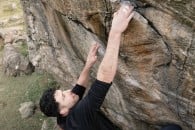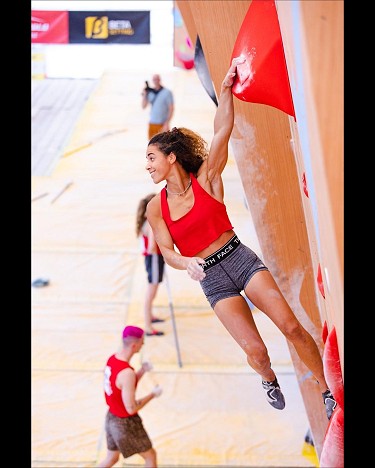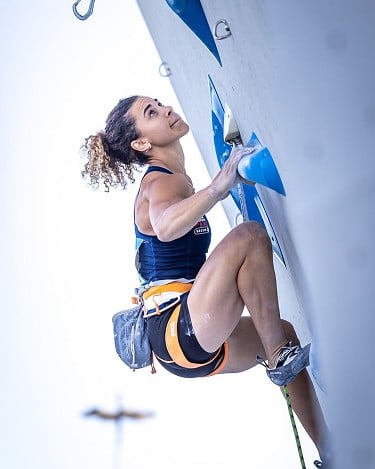
On September 21, 2022, Molly Thompson-Smith shared this photo:
Molly had been climbing at Gardom's Edge, attempting to sneak in a final session on the grit before heading to Jakarta for the last World Cup of the season and a well-deserved holiday. She was on Suavito, a three star Font 7B, described in the Peak Bouldering guidebook as: The superb leaning wall and arete to an airy finish. Molly fell from the very top of that airy finish, landed badly, and, looking down, saw her foot at a right angle. Jakarta was out of the question, as was the holiday she'd been looking forward to for so long, and the long road to recovery began.
At just 25 years old, it might sound peculiar to say that Molly has been a permanent feature of the British climbing scene for over a decade, but it's true. When I searched our galleries for the oldest photo we had of Molly, this one of her climbing in the 2011 IFSC World Youth Championship in Imst, Austria, came up.
In a stacked field featuring many of the big names of today - Jessie Pilz, Anak Verhoeven, Julia Chanourdie, Hannah Schubert, Stasa Gejo, and Chloe Caulier - Molly made finals, eventually finishing in 8th place. Two years later, at the age of 15, she won both the Youth A and the senior category at the British Lead Climbing Championships. She would go on to win the senior competition a further four times in the next five years.
Turn to 2022, and Molly climbed her way to a third place finish in the British Bouldering Championships, made semi-finals in each of the seven IFSC lead comps she entered, and was just a single hand-hold away from making finals in Koper.
Her track record is equally - if not more - impressive on rock. Molly has climbed five 8c routes, flashed and onsighted 8b, and climbed a further five boulders at Font 8B, one of which she managed in a single session. As far as the British scene goes, only Hazel Findlay and Emma Twyford have climbed harder routes outdoors, and only Shauna Coxsey has climbed a harder boulder.
What you may not know, however, is that each of these 8c routes and 8B boulders came after Molly ruptured her A2, A3, and A4 pulleys, all in a single finger. If you've seen the photo that Molly shared of the surgery (warning, it's pretty graphic) then you'll know how serious an injury this was. Yet Molly managed to not only return to the level she was performing at previously, but surpass it.
Molly casually locking off on Jerry's Traverse (f7B), three years after injuring that same hand
With her impressive recovery from this injury in mind, I got in touch with Molly to talk about her ankle, rehab, and motivation, as well as her hopes for the future, both in comps and on rock.
Hi Molly! How are you?
Hi! You've caught me at a good time! I'm doing well at the moment - feeling positive and excited as I've been making good progress with my ankle rehab and started climbing again.
Outside of climbing/rehab, what have you been up to recently?
Surprisingly not much! Rehab has taken up a significant amount of my time as it's a race against the clock to get back in shape (safely still!) for this year's WC competitions. But I've spent a lot of time seeing family and friends I missed during last year's comps, which has been really nice. Reading more books and trying to up my cooking game!
Speaking of food, you kept us all entertained over christmas with your mince pie reviews on instagram, what were the final results?
Ha! Everyone asks me about this! I guess the Waitrose No.1 Collection Brown Butter Mince Pies with cognac were top scorers, but I do wish I could've tried more pies. The 20 odd varieties I tried somehow weren't enough!
How's the ankle?
The ankle is looking and feeling more and more like an ankle each day! It's an exciting time at the moment as progress is daily rather than monthly. My mobility has improved since getting a screw taken out of it on Dec 28th, and the calf strength I've been severely lacking is slowly coming back meaning climbing is feeling more like climbing again and I'm able to do more in the gym.
Back on the wall, wearing the newest Scarpa prototype
What went through your mind when you first realised you were injured?
Honestly it was what my mum and coach were going to say! I was supposed to be flying out to Jakarta the day after I did it for the last WC of the season, as well as my mum's first big holiday in a long long time and to celebrate her retirement earlier in the year. I was feeling a bit caught out too because it was supposed to be a rest day! But I was mainly worried about the impact it would have on my future bouldering, knowing ankles are notorious for being unstable or leaving doubts in climber's minds for a long time after they've technically recovered.
How did those feelings change over the next couple of days?
I can't quite remember whether it had sunk in or not by then… having never broken a bone like this before or been this immobile, having things brought to me was almost a nice experience, but the novelty wore off very quickly! I also had hopes that I'd get a call any minute to come in and have surgery to get it fixed, so I wasn't feeling too down at that point. After that time though and with every day that passed without a surgery slot I started to realise the situation I was in, and that 'normal' was going to be a long, long way off.
How have those feelings changed now?
I've accepted and made peace with the situation. Like the last big injury I had, I can already appreciate the lessons or positives that have come out of it, though of course I would rather be taught in a different way! There was a time where I was frustrated at how dependent I was on everyone around me, but it's easier now that I'm almost back to normal and able to do a lot by myself.
The injury did make me aware of just how inaccessible life can be for some people with disabilities - whether it was trying to take public transport (in London it was a nightmare), not being confident to go out in busy spaces or bad weather on crutches (leaves are slippy!), not being able to have a 'coffee on the go' when you can't walk properly, and a whole host of other things that had never even occurred to me as difficulties. It made me really appreciate what an easy time I've had, and have, in day-to-day life up till now.
You've recently been able to get back on the wall - how has that been?
It's been scary but really good for my rehab I think. I actually waited five weeks before I even did a very light fingerboard session. It turned out my body and mind just needed a massive break from doing stuff, and being so immobile and incapable I didn't miss climbing at all, more doing 'normal' things like cooking for myself or not having to shuffle up/down stairs on my bum.
The first few times I went climbing it was really fun to move in a different way - I'd spent so long horizontal on the sofa or doing the odd seated yoga session or stretch. But I only did three auto belay/top rope sessions in the space of a month as it turned out I didn't really find it that fun after the first session. It was awkward, clunky in the walker boot, and I felt more scared than it was worth. So I didn't bother climbing that much as it didn't give me the feelings I love having from climbing - no freedom, flow, creativity, or joy really. So I mainly stuck to fingerboarding as that felt somewhat normal, and putting all my energy into my rehab exercises.
A few months down the line and the rehab has really paid off, and I'm back to what almost looks like normal climbing - just no falling yet!
Training in Innsbruck earlier this month
How is it being in the public eye whilst recovering from injury?
It's actually been quite a nice experience - I was overwhelmed by how many messages I received when I did it… it actually took me a few days to get through them all. I didn't expect that many people to care enough about me so it meant a lot and made me feel super supported. Then having posted the odd reel of some of the sessions I've done since the accident, I've received so many messages from people who've been injured, or needing some motivation. All of those messages have kept me going and given me the boost I've needed on some of the days where it's all felt a bit much.
That being said, I did also post and use social media a lot less than normal as I did struggle to see people training hard, competing, and going on climbing trips - all the things I'd planned to be doing and wished I was!
Is it typical for climbing athletes to receive support (financial, physio, psychological) from sponsors/national teams throughout injury? Are you able to receive any?
There's no funding for support like this from GB Climbing but hopefully that'll be something they have the budget for in the future. I was lucky enough to have my operations done through the NHS but that did mean it came with a wait time. Fortunately this accident was covered by insurance from being a BMC member but usually I would have to self-fund for physiotherapy.
Tell us about motivation - has it been a struggle? How does it compare to motivating yourself when uninjured?
Like usual, motivation ebbs and flows. Of course there were days where I just felt a bit sorry for myself and decided to take it easy, but other days I felt up to pushing myself a little more. But I tried my hardest throughout this period to take each day as it came and push myself in a way that was compatible with my mood and feelings.
Since being able to do a bit more, I have to say motivation has been more plentiful than usual. I've been competing for a long time now (almost 10 years of World Cups) and as much as I love it, I'd say it gets harder physically and mentally every year. I was struggling a lot for motivation last year, and although this injury has sucked in many ways, it's also been a massive disruption that has brought in some fresh motivation. I'd maybe put this down to my goals not being the same ones I've had for the last five years, but more focused on rehab goals or getting back to doing life again!
How do you approach rehab? Is it kind of like a training plan - with incremental goals?
Rehab is just like training - some of it feels hard at first but with repetition and persistence it gets easier. And then you make it harder again until it feels easier, and so on. The rehab was obviously prioritised over the last few months but I trained for climbing around it too. I'm very good at following a plan and working with numbers. So my physio and coach made sure I had a structured plan that I could follow.
Back to training
What lessons have you learned from your last injury that have helped you this time around?
My previous injury always reminds me that I'm a lot more resilient than I give myself credit for, and that barriers may be challenging but by no means are they impossible to overcome. It also reminds me that difficult periods that may seem like they'll last forever or are too much to handle, will come to an end eventually and may even one day feel like they were just a blip in time!
Is it difficult to have to depend on others for support? How have those around you made your recovery process more manageable?
Having to be dependent on others was one of the hardest parts of the injury for me. Luckily I have an amazing partner (Sam) who was a very good carer for that time where I needed help, and my parents who also came up to Sheffield to put in some looking-after shifts too! Sam would cook and clean as I wasn't really able to do anything for a while, and even on the days where he had to be out all day working he'd leave me meals all prepped in the fridge and a flask of tea waiting for me when I made my way down to the sofa for the day.
Now that I'm back climbing but not falling, Sam is still supporting me, giving me a close spot when I try something closer to my limit and might fall. Without these people I would've really struggled to make it through this period.
Has this injury allowed you to focus on other aspects of your climbing at all?
Not really any areas that I would consider weaknesses unfortunately! Having a lower leg injury has meant I've been doing lots of finger boarding, upper body conditioning, and campusing… all things I'd consider my strengths! Which has meant it's been a fairly fun training period, but I'm a bit nervous for when I have to come back to my weaknesses that I've neglected for all this time!
You've previously spoken about mini-victories when returning from injury - what are some of the mini victories you've had this time around?
Most of them were daily life things! Probably the biggest one being ditching the flask and back pack, and being able to carry my own cup of tea from the kitchen to the sofa without putting it down! That was a huge win for me! Others that come to mind are being able to have a shower, firstly without needing any help getting in, and then having one stood up! Some smaller ones are things like being able to sit at the table for a meal, or contribute to the cooking or cleaning.
What's something people might not know about the process of coming back from an injury at the top level?
When your self-esteem is so deeply linked with exercise and performance, not being able to do that or work towards it is really challenging mentally as well as psychically. Sitting on the sofa all day was really not fun when in my head I was counting every pull up rep missed, circuit not completed, or weakness I should've been working on.
Going from working out everyday to absolutely nothing meant I found it really hard to relax and I started being really cold and sleeping very few hours in the night. My body really just wasn't used to this!
First steps without crutches
Do you have any sense of time-scale for recovery - and how does this link up with Olympic qualifying? Am I right in thinking that the last chance to qualify is just a month before the Olympic games begin?
No concrete time scale unfortunately. I naively thought that I would have an exact comeback date as I'd broken bones which are much more common, and have had guaranteed healing times. But after a few delays I remembered that we're all different, and recovering from injuries is never a straightforward task.
But the goal is to be back in time to start competing again mid-way through the boulder world cup season this year. Olympic qualification is quite complicated, so although the last chance to qualify is in the spring of 2024, athletes have to qualify to that event through the 2023 overall world cup ranking. So qualification basically begins and could be over for most by the end of this year already.
You've always seemed like someone who isn't afraid to try new things. You've tried your hand at commentary at IFSC comps, provided in-studio analysis at the Tokyo Olympics, and hosted multiple sessions at Kendal Mountain Festival this year - are there any other new projects you're working on that you can tell us about?
No projects currently, as all my attention and focus is on rehab and getting back in time to have a chance at Olympic qualification. However I do really enjoy the odd bits of commentary or presenting I do, and definitely plan to continue that into the future once I've finished competing.
I remember reading somewhere that one of your goals was to make the first female ascent of Ben Moon's Hubble (9a) - what is it about the route that interests you so much? Do these big long-term goals seem more or less significant when you're injured?
The route kind of ticks all my boxes really - it's harder than anything I've climbed before, it's not yet been completed by a woman, it's athletic with a reachy start (maybe not typically considered a style that favours women?), it's steeped in history, and it's on my doorstep in the Peak District.
I spent years only trying climbs that I knew had been done by women as it meant it was definitely possible for me to do it, and on trips abroad I just wanted to come home with some successes. But that list was always fairly scant, as I presume most other women did the same thing when they looked at what to climb! So I'm really passionate about opening doors and trying to expand that list of options or possibilities for women, especially in the upper grades where the list really slims down.
I wouldn't say injuries cause these goals to become insignificant, more that they're just put to one side whilst more relevant ones take priority. The same goes for my Hubble goal; it's still very much there, and something I'm passionate about, it's just unrealistic to think about climbing it right now. However I am still training towards it, making sure that my fingers and upper body will be ready for when I'm able to start trying it again.
What about The Joker (f8A), or The Ace (f8B)? With Adam flashing The Ace the other week, it got me thinking about when we might see a first female ascent. It seems like a boulder that ticks some of the boxes you mentioned and might play to your strengths..
I have actually been up to the boulder, and the Joker unfortunately isn't an option as I can't reach the start holds! How ridiculous ha!? But the Ace is something I would like to try at some point, and as you say definitely ticks all of my boxes!
- REVIEW: Ocun Diamond S - Precision and power for steep boulders 8 Aug
- INTERVIEW: Paul 'Huffy' Houghoughi talks climbing, Olympics, and new chapters 19 Jun
- REVIEW: Black Diamond Circuit Z Bouldering Mat 6 Jun
- REVIEW: Scarpa Drago XT - One Drago to Rule Them All? 8 May
- SKILLS: What gear do you need for bouldering outside? 6 Mar
- REVIEW: Rab Kangri Gore-Tex Paclite Plus Jacket 10 Feb
- FEATURE: Climbing Archive: The Stone Circle 24 Dec, 2024
- VIDEO: Josh and Jack Ibbertson - Climbing as Kids, Redpointing in the UK, and Flatanger 3 Dec, 2024
- VIDEO: PREMIERE: The Risk Business | Chasing Pete Whillance 29 Nov, 2024
- INTERVIEW: One year later: Alex Waterhouse and Billy Ridal look back on their ascent of The Nose 8 Nov, 2024

























Comments
Looking forward to seeing Molly in lead finals come the summer.